The Future of Finance Podcast
Join us as we dive into the transformative power of finance and its potential to create a sustainable, equitable future. Hosted by Georges Dyer, Executive Director of the Intentional Endowments Network, this podcast brings together trailblazing experts, visionary investors, passionate students, and innovative thinkers across finance, academia, sustainability, policy, and civil society. Through engaging conversations, we explore big ideas like sustainable investing, impact-driven strategies, reimagining capitalism, tackling climate change, reducing inequality, and reshaping economic systems to better serve people and the planet. Whether you’re a student aspiring to shape the future of finance or an investor seeking meaningful impact, this podcast is your gateway to understanding how the financial system can evolve to meet today’s challenges and restore the natural systems we all depend on. Subscribe now and be part of the conversation shaping the future!
Episodes
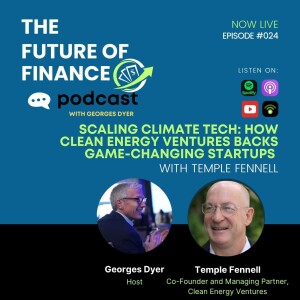
4 days ago
4 days ago
In this episode of the Future of Finance, host Georges Dyer speaks with Temple Fennell, Co-founder and Managing Director of Clean Energy Ventures, to explore the frontier of climate tech venture capital. Temple shares how his fund backs early-stage companies targeting the most difficult sectors to decarbonize—concrete, ammonia, cooling systems, battery recycling, and more—with the bold goal of mitigating 2.5 gigatons of CO₂ by 2050. The conversation covers Clean Energy Ventures’ investment strategy, impact measurement through a proprietary emissions calculator, the intersection of technical rigor and scalable innovation, and the role of strategic partnerships in growing climate solutions. Temple also delves into the importance of policy-agnostic business models, underappreciated sectors like cooling and water, and his work supporting family offices and next-generation investors. This is a candid and in-depth look at how venture capital is fueling the clean energy transition.
Keywords: Climate tech, venture capital, emissions reduction, clean energy ventures, decarbonization, cooling systems, battery recycling, hydrogen and ammonia, impact investing, early-stage innovation
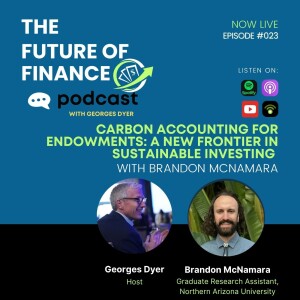
Wednesday Jul 02, 2025
Wednesday Jul 02, 2025
In this episode of The Future of Finance, host Georges Dyer speaks with Brandon McNamara, Ph.D., a researcher at Northern Arizona University, about how endowments and institutional investors can better measure and manage the greenhouse gas (GHG) emissions embedded in their investment portfolios. Brandon shares the details of his groundbreaking research analyzing the carbon footprint of NAU’s endowment, using the Partnership for Carbon Accounting Financials (PCAF) framework. They dive into how carbon accounting for investments works, the challenges of Scope 3 emissions, and how universities can integrate climate data into decision-making around divestment and engagement. Brandon also reflects on how academia can help drive real-world impact and offers advice to students entering the sustainable finance field.
Keywords: Carbon accounting, scope 3 emissions, university endowments, sustainable investing, PCAF, divestment vs. engagement, climate risk, investment portfolios, ESG strategy, greenhouse gas emissions
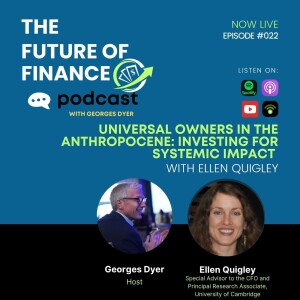
Wednesday Jun 25, 2025
Wednesday Jun 25, 2025
In this compelling episode of The Future of Finance, Georges Dyer speaks with Dr. Ellen Quigley, Principal Research Associate at the University of Cambridge and Special Adviser to the university's CFO on Responsible Investment. Ellen breaks down the concept of universal ownership, the risks of climate change through the lens of systemic investing, and how endowments and other long-term asset owners can be powerful agents of change.
She also introduces a groundbreaking corporate bond index designed to avoid funding fossil fuel expansion while encouraging investor impact through tools like debt denial and director vote strategies. Ellen critically examines ESG investing, warns about the under-recognized dangers of methane-heavy infrastructure, and calls for investors to shift the social discourse in ways that legitimize climate-aligned policy.
Through practical examples and philosophical insights, this episode offers a rich, urgent, and ultimately hopeful look at how finance can be reimagined to serve people and the planet.
Keywords: Universal ownership, anthropocene, systemic risk, fossil fuel divestment, responsible investment, corporate bond index, director votes, climate change, asset owners vs asset managers, endowment model
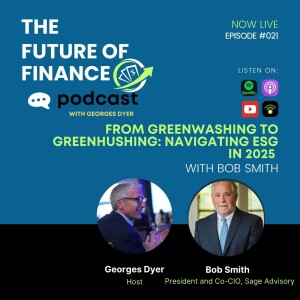
Wednesday Jun 18, 2025
Wednesday Jun 18, 2025
In this episode of the Future of Finance, host Georges Dyer sits down with Bob Smith, Co-Founder, President, and Co-Chief Investment Officer at Sage Advisory. Bob shares his firm’s evolution since its founding in 1996—from two people and a Bloomberg terminal to managing $30 billion in assets—driven by a mission to align investments with purpose. The conversation dives deep into Sage’s approach to purpose-driven and liability-aware investing, their proprietary ESG scoring system (the Leaf Score), and how they’ve built ESG integration into fixed income and ETF strategies.
Bob also provides a candid view of how today’s political climate has impacted sustainable investing, the retreat in corporate stewardship, and the dangers of “greenhushing” alongside greenwashing. The episode explores policy ideas like carbon pricing, the sustainability tradeoffs of tariffs, and the role of AI and blockchain in the future of finance. Listeners will walk away with actionable insights on building resilience, transparency, and values alignment in investment strategies.
Keywords: ESG investing, purpose-driven finance, fixed income strategies, Leaf Score, greenwashing and greenhushing, political backlash on ESG, tariffs and sustainability, carbon pricing, AI in finance, sustainable investment frameworks
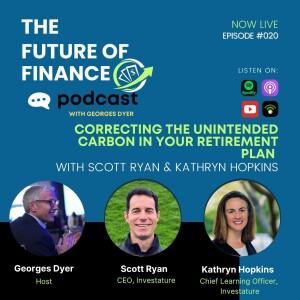
Wednesday Jun 11, 2025
Wednesday Jun 11, 2025
In this insightful episode of The Future of Finance, host Georges Dyer sits down with Scott Ryan and Kathryn Hopkins of Investature, a mission-driven firm aiming to align retirement plan investing with climate impact. The conversation explores how retirement plans—representing trillions of dollars in assets—can be powerful tools for addressing climate change. Scott shares his journey from fintech to founding Investature, emphasizing the often-overlooked role of financed emissions and how individual and institutional decisions in retirement plans can directly reduce carbon footprints.
Kathryn brings an educational lens to the conversation, underscoring the importance of financial literacy and helping people understand that they can have a double bottom line—achieving both financial returns and environmental impact. Together, they outline barriers such as litigation fears and lack of awareness, while offering actionable solutions for employees, employers, and institutions.
They call for a cultural shift in fiduciary thinking, where choosing sustainable investment options is no longer seen as a risk—but as a fiduciary duty. With compelling examples, like how $1,000 in a climate fund can offset the emissions of a cross-country flight annually, they demonstrate the tangible power of intentional investing. This episode is a roadmap for individuals and organizations ready to take bold, climate-conscious steps in finance.
Keywords:
Climate finance, retirement plans, double bottom line, fiduciary duty, sustainable investing, financed emissions, financial literacy, 401(k) engagement, climate solutions, impact investing
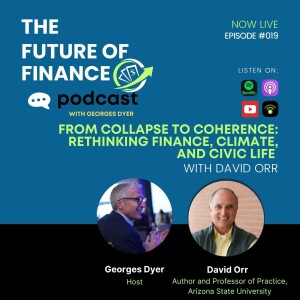
Wednesday Jun 04, 2025
Wednesday Jun 04, 2025
In this compelling episode of The Future of Finance, host Georges Dyer speaks with Dr. David Orr, a pioneering voice in ecological economics and democracy reform. Orr, a professor and author of Democracy in a Hotter Time and Dangerous Years, discusses the urgent need to rethink our economic and political systems in light of climate change, democratic erosion, and AI risks. He shares the origins of ecological literacy, the failures of traditional economic models to account for planetary boundaries, and the opportunity to create “Democracy 4.0”—a rights-based, systems-aware democracy fit for the 21st century. With thoughtful insights on the role of education, endowment investing, and human morality, Orr calls for bold, collective action in what he sees as a pivotal moment in human history. This conversation is both a warning and a hopeful guide for rebuilding our systems to better serve future generations and the planet.
Keywords: Ecological economics, democracy 4.0, climate change, systems thinking, higher education reform, AI risks, endowment investing, infinite growth fallacy, civic and moral revival, sustainability and justice
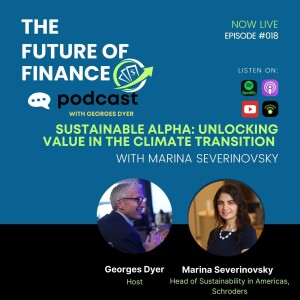
Wednesday May 28, 2025
Wednesday May 28, 2025
In this episode of The Future of Finance, Georges Dyer sits down with Marina Severinovsky, Head of Sustainability for the Americas at Schroders, a $1 trillion global investment manager. They explore key themes shaping sustainable investing in 2025, based on Schroders’ proprietary research and reports—including an Oxford University collaboration on "Impact as a Source of Alpha." Marina breaks down how institutional investors can tap into climate resilience, private market decarbonization, and thematic investing, with an emphasis on opportunities, not just risks.
Marina outlines three primary categories for climate investments—low-carbon, transition/climate action, and solutions—and explains how impact-driven businesses can outperform through operational strength and lower volatility. She also dives into the growing importance of physical climate risks (like insurance and health impacts), the evolution of policy frameworks, and the vital role private markets play in funding emerging solutions. With deep insights into sustainable real estate, infrastructure, and nature-positive investing, this episode is a must-listen for anyone interested in the changing landscape of ESG and sustainable finance.
Keywords: Sustainable investing, impact investing, climate transition, ESG trends, decarbonization, private markets, biodiversity and nature, physical climate risk, long-term returns, policy and regulation
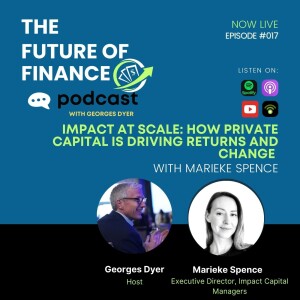
Wednesday May 21, 2025
Wednesday May 21, 2025
In this episode, host Georges Dyer welcomes Marieke Spence to discuss the expanding frontier of impact investing in private markets. As head of ICM—a selective network of over 150 private capital funds managing $70B in impact-focused assets—Marieke sheds light on how market-rate return strategies can align with meaningful, measurable impact. The conversation explores ICM’s foundational mission, emerging trends like employee ownership, performance data demonstrating competitive IRRs, and the growing interest among institutional allocators.
Marieke also shares the success of ICM’s Mosaic Fellowship, which places graduate students in impact funds to build the next generation of diverse, skilled talent. She highlights how impact investing doesn't require a trade-off in returns and offers insights into how fiduciary duty, risk assessment, and impact measurement are evolving. This episode is a powerful reminder that finance and positive change are not mutually exclusive.
Keywords: Impact investing, private capital, fiduciary duty, market-rate returns, mosaic fellowship, institutional allocators, ESG and sustainability, impact measurement, employee ownership, financial inclusion
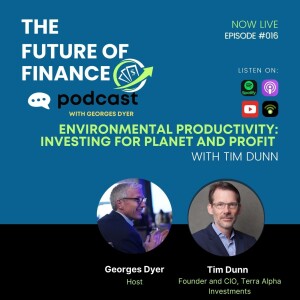
Wednesday May 14, 2025
Wednesday May 14, 2025
In this episode of the Future of Finance podcast, host Georges Dyer sits down with Tim Dunn, Co-Founder and Chief Investment Officer of Terra Alpha Investments. Drawing on his decades of experience - including managing $26 billion at Capital Group - Dunn shares the evolution of his career from a traditional investor to a sustainability-driven asset manager. He unpacks Terra Alpha’s core investment thesis: that environmental productivity - measuring how companies impact and depend on natural resources - is not only essential for reducing risk but also for generating competitive returns and real-world environmental impact.
The conversation explores how Terra Alpha engages directly with companies to encourage science-based targets and decarbonization strategies, including their early commitment to only invest in companies disclosing Scope 1 and 2 emissions. Dunn provides a candid view on today’s political and financial climate, warning that while investor interest is growing, regulatory and market headwinds threaten progress. Yet, he remains optimistic that a more informed, engaged financial system - grounded in science and transparency - can drive the transformation needed.
Keywords: Environmental productivity, science-based targets, climate risk, ESG investing, decarbonization, sustainable finance, impact measurement, carbon disclosure project, public equities, capital markets reform
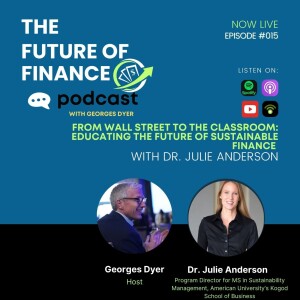
Wednesday May 07, 2025
Wednesday May 07, 2025
In this episode of the Future of Finance podcast, host George Dyer speaks with Dr. Julie Anderson, Director of the M.S. in Sustainability Management Program at American University’s Kogod School of Business. Drawing from a 25-year career in investment management—including leadership roles in ESG product development and emerging markets strategy—Dr. Anderson shares how she’s now equipping the next generation of sustainability professionals. The conversation explores the evolution of sustainable finance, the megatrend status of sustainability, and the critical skills employers are demanding—such as systems thinking, stakeholder engagement, and change management.
Julie also discusses the innovative, interdisciplinary, and experiential design of her graduate program, the value of real-world capstone projects, and the importance of grounding financial decisions in long-term materiality. She reflects on the backlash against ESG, the evolving regulatory landscape, and why creativity and fresh perspectives are vital to building a sustainable economy. The episode is a compelling look into the academic-industry bridge shaping the future of sustainable finance.
Keywords: Sustainable finance, ESG integration, systems thinking, stakeholder engagement, sustainability education, experiential learning, change management, investment management, climate risk disclosure, megatrends in finance







